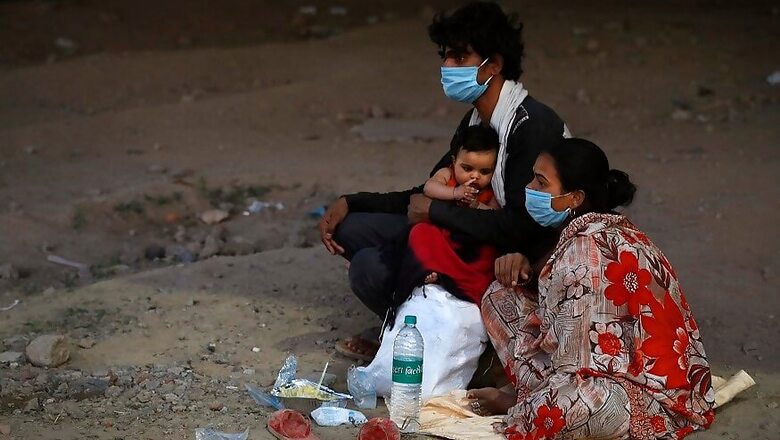
views
A first-of-its-kind survey on the state of migrant workers who have returned to their homes in Bihar has revealed some worrying facts about their worsening situation. More than 50 per cent of those surveyed are only having one meal a day, the debt situation has worsened for around 70 per cent of the workers and less than 1 per cent of the workers feel that their savings are enough.
Also, none of the workers reported receiving any kind of cash assistance during the lockdown while they were stranded.
The survey, which was conducted on 177 workers who had returned from various parts of the country to 15 districts of Bihar, is by the NGO ActionAid India. The research done on the residents of Bihar who had gone out to other states for work, is part of a larger pan-India study that the organisation, which has been working with informal workers and on the issue of urban homelessness, has been carrying out for some time now. Migrant workers reported being stranded on an average for 18 days before they could even begin their journey back home.
To start, the workers were asked the reasons for vacating their homes in the cities where they had gone to work. Most of the respondents, nearly a third, said that they were evicted by their landlords. The next big reason for the migrant workers for vacating their homes was because 26 per cent of them did not have any jobs to survive on.
"Our rapid assessment from the state of Bihar shows us that around 82 per cent of respondents lost their jobs and returned to their home districts. More than 60 per cent of them returned home without receiving any wages from their last employer in their destination cities," the report states.
The loss of wages and the hardships endured by the workers since then have taken a toll on the amount of food and water that they have been consuming since.
"Due to the sudden and drastic loss of income and lack of access, the level of food considered to be sufficient steeply dropped from 72 per cent to 8 per cent as reported by the respondents. As compared to pre-lockdown, 71 per cent of respondents used to have access to sufficient water, but that too has declined to 38 per cent during the lockdown...If such situation persists for few more weeks, then this will further expose them to starvation and other forms of vulnerability," the study found.
The report quotes Rahul Suresh Sapkal, an academic, who is also part of the research team for this survey, saying that "close to 161 million workers are at high risk of job loss during the ensuing crisis".
Around 66 per cent of the migrants returned home with no wages, 14 per cent received full wages, and 21 per cent received partial wages after the lockdown was announced. The loss of wages have pushed the migrant workers deeper into debt.
"Prior to the lockdown, approximately 40 per cent of respondents reported to have an average debt of Rs 53,000 per person in our sample. However, in the lockdown period, the intensity of indebtedness has been exacerbated for two-thirds (68 per cent) of the respondents. The debt amount ranges from Rs 40,000 to Rs 2,80,000. The rise in indebtedness has been reported on account of household expenses, health emergencies and to meet expenses related to agriculture for the upcoming kharif season," the report further states.
In what may also be a telling comment on the hardships being faced by migrant workers who have been desperately trying to reach their homes, 85 per cent of the workers said that they did not receive any form of assistance (either for travel/food/housing) from the government and the remaining 15 per cent of workers reported to have at least food assistance in their destination states.
The Supreme Court on Thursday forbade the railways and state governments from charging train or bus fares from stranded migrant workers waiting to return home in the ongoing national lockdown. The court said that those found walking should be escorted to the nearest camps where they should be looked after. States should simplify and speed up the process of registration of migrant workers.
Nine workers have been reported to have died in Shramik trains, apart from hundreds of other workers who are reported to have died in road accidents, of exhaustion and of various illnesses, while trying to get to their homes, since the lockdown was first imposed.




















Comments
0 comment